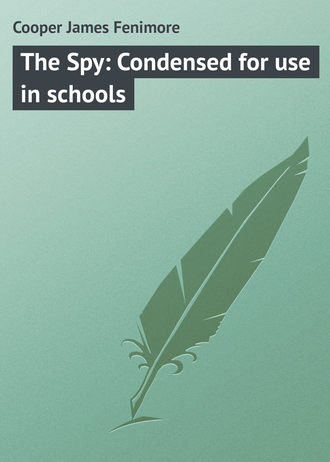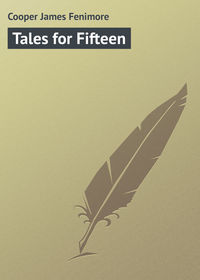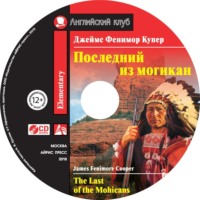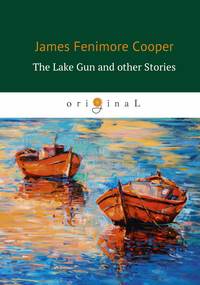 полная версия
полная версияThe Spy: Condensed for use in schools
Dunwoodie’s men now sat panting to be led once more against foes whom they seldom charged in vain. A few minutes enabled the major to distinguish their character. In one troop he saw the green coats of the Cow-Boys and in the other the leathern helmets and wooden saddles of the yagers.54 Their numbers were about equal to the body under his immediate orders.
On reaching the open space near the cottage of Harvey Birch, the enemy halted and drew up his men in line, evidently making preparations for a charge. At this moment a column of foot appeared in the vale, and pressed forward to the bank of the brook we have already mentioned.
Major Dunwoodie at once saw his advantage, and determined to profit by it. The column he led began slowly to retire from the field, when the youthful German who commanded the enemy’s horse, fearful of missing an easy conquest, gave the word to charge. The Cow-Boys sprang eagerly forward in the pursuit; the Hessians followed more slowly, but in better order. The trumpets of the Virginians now sounded long and lively; they were answered by a strain from the party in ambush that went to the hearts of their enemies. The column of Dunwoodie wheeled in perfect order, opened, and, as the word of charge was given, the troops of Lawton emerged from their cover, with their leader in advance, waving his sabre over his head, and shouting in a voice that was heard above the clamor of the martial music.
The charge threatened too much for the refugee troop. They scattered in every direction, flying from the field as fast as their horses could carry them. It was upon the poor vassals of the German tyrant that the shock fell. Many of them were literally ridden down, and Dunwoodie soon saw the field without an opposing foe.
Captain Wharton had been left in the keeping of two dragoons, one of whom marched to and fro on the piazza with a measured tread, and the other had been directed to continue in the same apartment with the prisoner.
The lawn in front of the Locusts was hidden from the road by a line of shrubbery, and the horses of the two dragoons had been left under its shelter to await the movements of their masters.
At this moment two Cow-Boys, who had been cut off from a retreat to their own party, rode furiously through the gate, with an intention of escaping to the open wood in the rear of the cottage. Feeling themselves in the privacy of the lawn, relieved from any immediate danger, they yielded to a temptation that few of the corps were ever known to resist – opportunity and horseflesh – and made towards their intended prizes by an almost spontaneous movement. They were busily engaged in separating the fastenings of the horses, when the trooper on the piazza discharged his pistols, and rushed, sword in hand, to the rescue.
This drew the wary dragoon in the parlor to the window.
He threw his body out of the building, and with dreadful imprecations endeavored by threats and appearance to frighten the marauders from their prey. The moment was enticing. Three hundred of his comrades were within a mile of the cottage; unridden horses were running at large in every direction, and Henry Wharton seized the unconscious sentinel by his legs and threw him headlong into the lawn. Cæsar vanished from the room, and drew a bolt of the outer door.
Recovering his feet, the sentinel turned his fury for a moment on his prisoner. To scale the window in the face of such an enemy, was, however, impossible, and on trial he found the main entrance barred.
His comrade now called loudly upon him for aid, and forgetting everything else, the discomfited trooper rushed to his assistance. One horse was instantly liberated, but the other was already fastened to the saddle of a Cow-Boy, and the four retired behind the building, cutting furiously at each other with their sabres, and making the air resound with their imprecations. Cæsar threw the outer door open, and pointing to the remaining horse, that was quietly biting the faded herbage of the lawn, he exclaimed:
“Run, now, run – Massa Harry, run!”
“Yes,” cried the youth, as he vaulted into the saddle, “now indeed, my honest fellow, is the time to run.”
When the fortune of the day was decided, and the time arrived for the burial of the dead, two Cow-Boys and a Virginian were found in the rear of the Locusts, to be included in the number.
Wharton’s horse was of the best Virginian blood, and carried him with the swiftness of the wind along the valley; and the heart of the youth was already beating tumultuously with pleasure of his deliverance, when a well-known voice reached his startled ear, crying loudly:
“Bravely done, captain! Don’t spare the whip, and turn to your left before you cross the brook.”
Wharton turned his head in surprise, and saw, sitting on the point of a jutting rock that commanded a bird’s-eye view of the valley, his former guide, Harvey Birch. The English captain took the advice of this mysterious being, and finding a good road which led to the highway that intersected the valley, turned down its direction, and was soon opposite to his friends. The next minute he crossed the bridge, and stopped his charger before his old acquaintance, Colonel Wellmere.
“Captain Wharton!” exclaimed the astonished commander of the English troops.
“Thank God!” cried the youth, recovering his breath, “I am safe, and have escaped from the hands of my enemies.”
The captain briefly explained to the group of listeners the manner of his capture, the grounds of his personal apprehensions, and the method of his escape. By the time he had concluded his narration, the fugitive Germans were collected in the rear of the column of infantry, and Colonel Wellmere cried aloud:
“From my soul I congratulate you, my brave friend; prepare yourself to grant me your assistance, and I will soon afford you a noble revenge.”
“I do not think it altogether prudent to cross this brook into the open plain, in the face of those Virginian horse, flushed as they must be with the success they have just obtained,” returned young Wharton.
“Do you call the rout of those irregulars and these sluggish Hessians a deed to boast of?” said the other.
“And I must be allowed to say, Colonel Wellmere, that if the body-guards of my king were in yon field, they would meet a foe that it would be dangerous to despise. Sir, Mr. Dunwoodie is the pride of Washington’s army as a cavalry officer,” cried Henry, with warmth.
Colonel Wellmere inquired with a supercilious55 smile:
“You would not have us retire, sir, before these boasted horsemen, without doing something that may deprive them of part of the glory which you appear to think they have gained?”
“I would have you advised, Colonel Wellmere, of the danger you are about to encounter.”
“Danger is but an unseemly word for a soldier,” continued the British commander, with a sneer.
“And one as little dreaded by the 60th as any corps who wear the royal livery,” cried Henry Wharton, fiercely; “give but the word to charge, and let our actions speak.”
“Now again I know my friend,” cried Wellmere, soothingly; “but if you have anything to say before we fight that can in any manner help us in our attack, we’ll listen. You know the force of the rebels; are there more of them in ambush?”
“Yes,” replied the youth, chafing still under the other’s sneers; “in the skirt of the wood on our right are a small party of foot; their horse are all before you.”
“Where they will not continue long,” cried Wellmere, turning to the few officers around him. “Gentlemen, we will cross the stream in column and display on the plain beyond, or else we shall not be able to entice these valiant Yankees within the reach of our muskets. Captain Wharton, I claim your assistance as an aide-de-camp.”
The youth shook his head in disapprobation of a movement which his good sense taught him was rash, but prepared with alacrity to perform his duty in the impending trial.
CHAPTER VII.
DUNWOODIE’S TRAP AND THE RECAPTURE OF CAPTAIN WHARTON
During this conversation, which was held at a small distance in advance of the British column, and in full view of the Americans, Dunwoodie had been collecting his scattered troops, securing his few prisoners, and retiring to the ground where he had been posted at the first appearance of his enemy.
Captain Lawton suddenly exclaimed: “How’s this! a blue coat among those scarlet gentry? As I hope to live to see old Virginia, it is my masquerading friend of the 60th, the handsome Captain Wharton, escaping from two of my best men!”
He had not done speaking when the survivor of these heroes joined his troop, bringing with him his own horse and those of the Cow-Boys; he reported the death of his comrade, and the escape of his prisoner.
This intelligence made an entire change in the views of Major Dunwoodie. He saw at once that his own reputation was involved in the escape of the prisoner, and he now joined with Lawton, watching for an opening to assail his foe to advantage.
“There,” cried the delighted captain, as he pointed out the movement of Wellmere crossing the brook into the open plain; “there comes John Bull into the mousetrap, and with his eyes wide open.”
“Surely,” said Dunwoodie, eagerly, “he will not display his column on that flat. Wharton must tell him of the ambush. But if he does – ”
“We will not leave him a dozen sound skins in his battalion,” interrupted the other, springing into his saddle.
The truth was soon apparent; for the English column, after advancing for a short distance on the level land, displayed with an accuracy that would have done them honor on a field-day in their own Hyde Park.56
“Prepare to mount – mount!” cried Dunwoodie.
As the British line advanced slowly and in exact order, the guides opened a galling fire. It began to annoy that part of the royal troops which was nearest to them. Wellmere listened to the advice of the veteran who was next to him in rank, and ordered two companies to dislodge the American foot from their hiding-place. The movement created a slight confusion, and Dunwoodie seized the opportunity to charge. No ground could be more favorable for the manœuvres57 of horse, and the attack of the Virginian was irresistible. It was aimed chiefly at the bank opposite the wood, in order to clear the Americans from the fire of their friends who were concealed; and it was completely successful. Wellmere, who was on the left of the line, was overthrown by the impetuous58 fury of his assailants. Dunwoodie was in time to save him from the impending blow of one of his men, and raised him from the ground, had him placed on a horse, and delivered to the custody of his orderly.
The left of the British line was outflanked by the Americans, who doubled in their rear, and thus made the rout in that quarter total. Henry Wharton, who had volunteered to assist in dispersing the guides, was struck on his bridle-arm by a ball, which compelled him to change hands. His charger became ungovernable, and his rider, being unable with his wounded arm to manage the impatient animal, Henry Wharton found himself, in less than a minute, unwillingly riding by the side of Captain Lawton. The dragoon comprehended at a glance the ludicrous situation of his new comrade, but he had only time to cry aloud before they plunged into the English line:
“The horse knows the righteous cause better than his rider. Captain Wharton, you are welcome to the ranks of freedom.”
No time was lost, however, by Lawton, after the charge was completed, in securing his prisoner again; and perceiving him to be hurt, he directed him to be conveyed to the rear.
Captain Lawton called to a youth, who commanded the other troop, and proposed charging the unbroken line of the British. The proposition was as promptly accepted as it had been made, and the troops were arrayed for the purpose. The eagerness of their leader prevented the preparations necessary to insure success, and the horse, receiving a destructive fire as they advanced, were thrown into additional confusion. Both Lawton and his more juvenile comrade fell at this discharge. Fortunately for the credit of the Virginians, Major Dunwoodie reëntered the field at this critical instant. The eye of the youthful warrior flashed fire. At his feet lay Captain Singleton and Captain Lawton. Riding between his squadron and the enemy, in a voice that reached the hearts of his dragoons, he recalled them to their duty. His presence and words acted like magic. The line was formed promptly and with exactitude; the charge sounded; and, led on by their commander, the Virginians swept across the plain with an impetuosity that nothing could withstand, and the field was instantly cleared of the enemy; those who were not destroyed sought a shelter in the woods. Dunwoodie slowly withdrew from the fire of the English, who were covered by the trees, and commenced the painful duty of collecting the dead and wounded.
The guides took charge of Wharton, and, with a heavy heart, the young man retraced his steps to his father’s cottage.
The English had lost in the several charges about one-third of their foot, but the remainder were rallied in the wood; and Dunwoodie, perceiving them to be too strongly posted to assail, had left a strong party with Captain Lawton, with orders to watch their motions, and to seize every opportunity to harass them before they reëmbarked.
Intelligence had reached the major of another party being out by way of the Hudson, and his duty required that he should hold himself in readiness to defeat the intentions of these also. Captain Lawton received his orders with strong injunctions to make no assault on the foe, unless a favorable chance should offer.
The injury received by this officer was in the head, being stunned by a glancing bullet; and parting with a laughing declaration from the major, that if he again forgot himself, they should all think him more materially hurt, each took his own course.
It became incumbent on Dunwoodie to arrange the disposal of his prisoners. Sitgreaves he determined to leave in the cottage of Mr. Wharton, in attendance on Captain Singleton. Henry came to him with a request that Colonel Wellmere might also be left behind, under his parole. To this the major cheerfully assented.
Captain Wharton voluntarily gave a pledge to his keepers not to attempt to escape, and then proceeded to execute those duties, on behalf of his father, which were thought necessary in a host.
His duty to the wounded performed, Dunwoodie proceeded to the field where his troops had halted. The remnant of the English were already seen, over the tops of the trees, marching along the heights towards their boats, in compact order and with great watchfulness.
The party under Lawton had watched the retiring foe to his boats with the most unremitting vigilance, without finding any fit opening for a charge. The dragoons lingered on the shore till the last moment, and then they reluctantly commenced their own retreat back to the main body of the corps, which had retired to a small hamlet a short distance above the Locusts, where several roads intersected each other. This was a favorite halting place of the horse, and frequently held by light parties of the American army, during their excursions below.
CHAPTER VIII.
THE PURSUIT. – BIRCH’S ESCAPE
The gathering mists of the evening had begun to darken the valley, as the detachment of Lawton made its reappearance at its southern extremity. The march of the troops was slow and their line extended, for the benefit of ease. In the front rode the captain, side by side with his senior subaltern,59 apparently engaged in close conference, while the rear was brought up by a young cornet, humming an air, and thinking of the sweets of a straw bed after the fatigues of a hard day’s duty.
“Well, Tom, a slanderous propensity60 is incurable – but,” stretching his body forward in the direction he was gazing, as if to aid him in distinguishing objects through the darkness, “what animal is moving through the field on our right?”
“’Tis a man,” said Mason, looking intently at the suspicious object.
“By his hump ’tis a dromedary!” added the captain, eying it keenly. Wheeling his horse suddenly from the highway, he exclaimed, “Harvey Birch! – take him, dead or alive!”
A dozen of the men, with the lieutenant at their head, followed the impetuous Lawton, and their speed threatened the pursued with a sudden termination of the race.
Birch prudently kept his position on the rock, where he had been seen by the passing glance of Henry Wharton, until evening had begun to shroud the surrounding objects in darkness. It was with difficulty that he had curbed his impatience until the obscurity of night should render his moving free from danger. He had not, however, completed a fourth of his way to his own residence, when his quick ear distinguished the tread of the approaching horse. Trusting to the increasing darkness, he determined to persevere. By crouching, and moving quickly along the surface of the ground, he hoped to escape unseen. Captain Lawton was too much engrossed in conversation to suffer his eyes to indulge in their usual wandering; and the peddler, perceiving by the voices that the enemy he most feared had passed, yielded to his impatience, and stood erect, in order to make greater progress. The moment his body rose above the shadow of the ground it was seen, and the chase commenced. For a single instant Birch was helpless, his blood curdling in his veins at the imminence61 of the danger, and his legs refusing their natural and necessary office. But it was only for a minute; casting his pack where he stood, and instinctively tightening the belt he wore, the peddler betook himself to flight. He knew that by bringing himself in line with his pursuers and the wood, his form would be lost to sight. This he soon effected, and he was straining every nerve to gain the wood itself, when several horsemen rode by him but a short distance on his left, and cut him off from this place of refuge. The peddler threw himself on the ground as they came near him, and was passed unseen. But delay now became too dangerous for him to remain in that position. He accordingly rose, and still keeping in the shadow of the wood, along the skirts of which he heard voices crying to each other to be watchful, he ran with incredible speed in a parallel line, but in an opposite direction, to the march of the dragoons.
At this instant the voice of Lawton rang through the valley, shouting:
“Harvey Birch! – take him, dead or alive!”
Fifty pistols lighted the scene, and the bullets whistled in every direction around the head of the devoted peddler.
A feeling of despair seized his heart, and in the bitterness of that moment he exclaimed:
“Hunted like a beast of the forest!”
These considerations, with the approaching footsteps of his pursuers, roused him to new exertions. A fragment of wall, that had withstood the ravages made by the war in the adjoining fences of wood, fortunately crossed his path. He hardly had time to throw his exhausted limbs over this barrier before twenty of his enemies reached its opposite side. Their horses refused to take the leap in the dark, and amid the confusion Birch was enabled to gain a sight of the base of the hill, on whose summit was a place of perfect safety. The heart of the peddler now beat high with hope, when the voice of Captain Lawton again rang in his ears, shouting to his men to make room. The order was obeyed, and the fearless trooper rode at the wall at the top of his horse’s speed, plunged the rowels in his charger, and flew over the obstacle in safety.
The triumphant hurrah of the men, and the thundering tread of the horse, too plainly assured the peddler of the emergency62 of his danger. He was nearly exhausted, and his fate no longer seemed doubtful.
“Stop, or die!” was uttered above his head, and in fearful proximity to his ears.
Harvey stole a glance over his shoulder, and saw, within a bound of him, the man he most dreaded. By the light of the stars he beheld the uplifted arm and the threatening sabre. Fear, exhaustion, and despair seized his heart, and the intended victim fell at the feet of the dragoon. The horse of Lawton struck the prostrate peddler, and both steed and rider came violently to the earth.
As quick as thought Birch was on his feet again, with the sword of the discomfited dragoon in his hand. All the wrongs of the peddler shone on his brain with a dazzling brightness. For a moment the demon within him prevailed, and Birch brandished the powerful weapon in the air; in the next it fell harmless on the reviving but helpless trooper. The peddler vanished up the side of the friendly rock.
“Help Captain Lawton, there!” cried Mason, as he rode up, followed by a dozen of his men; “and some of you dismount with me and search these rocks; the villain lies here concealed.”
“Hold!” roared the discomfited captain, raising himself with difficulty on his feet; “if one of you dismount, he dies. Tom, my good fellow, you will help me to straddle Roanoke again.”
The astonished subaltern complied in silence, while the wondering dragoons remained as fixed in their saddles as if they composed a part of the animals they rode.
Lawton and Mason rode on in silence, the latter ruminating63 on the wonderful change produced in his commander by his fall, when they arrived opposite to the gate before the residence of Mr. Wharton. The troop continued its march, but the captain and his lieutenant dismounted, and, followed by the servant of the former, they proceeded slowly to the door of the cottage.
A few words from Mason explained the nature and manner of his captain’s hurts, and Miss Peyton cheerfully accorded the required accommodations. While the room intended for the trooper was getting ready, and the doctor was giving certain portentous64 orders, the captain was invited to rest himself in the parlor.
CHAPTER IX.
THE UNWELCOME VISITORS
The house of Birch had been watched at different times by the Americans with a view to his arrest, but never with success, the reputed spy possessing a secret means of intelligence that invariably defeated their schemes. Once, when a strong body of the Continental army held the Four Corners for a whole summer, orders had been received from Washington himself never to leave the door of Harvey Birch unwatched. The command was rigidly obeyed, and during this long period the peddler was unseen; the detachment was withdrawn, and the following night Birch reëntered his dwelling.
The father of Harvey had kept his dying situation a secret from the neighborhood, in the hope that he might still have the company of his child in his last moments. The confusion of the day, and his increasing dread that Harvey might be too late, helped to hasten the event he would fain arrest for a little while. As night set in his illness increased to such a degree that the dismayed housekeeper sent a truant boy, who had shut up himself with them during the combat, to the Locusts in quest65 of a companion to cheer her solitude. Cæsar alone could be spared, and, loaded with eatables and cordials by the kind-hearted Miss Peyton, the black had been despatched on his duty. The dying man was past the use of medicines, and his chief anxiety seemed to centre in a meeting with his child.
The old man had closed his eyes, and his attendants believed him to be asleep. The house contained two large rooms and many small ones. One of the former served as kitchen and sitting-room; in the other lay the father of Birch; of the latter one was the sanctuary of the vestal, and the other contained the stock of provisions. A huge chimney of stone rose in the centre, serving of itself for a partition between the large rooms; and fireplaces of corresponding dimensions were in each apartment. A bright flame was burning in that of the common room, and within the very jambs of its monstrous jaws sat Cæsar and Katy. The African was impressing his caution on the housekeeper, and commenting on the general danger of indulging an idle curiosity, when his roving eyes suddenly became fixed, and his teeth chattered with affright. Katy, turning her face, saw the peddler himself standing within the door of the room.
“Is he alive?” asked Birch, tremulously, and seemingly afraid to receive the answer.
“Surely,” said Katy, rising hastily, and officiously offering her chair; “he must live till day, or till the tide is down.”









